Review: Andromeda Spaceways #48
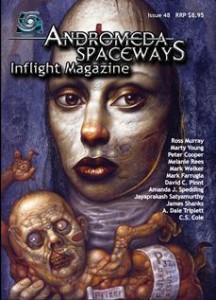 As I mentioned in my review of ASIM #47 last month, I enjoyed that first issue enough that I decided it was well worth my money to get a subscription. Well, my family’s money anyway. I was having trouble thinking of items for my Christmas list, and put a digital subscription to ASIM on there. So I got to celebrate Christmas a bit early. One thing that I was very interested to see was whether or not the quality of the magazine would feel consistent from issue to issue. ASIM, you see, has a rotating set of editors who each take turns in the captain’s chair. #47 was edited by Patty Jansen. #48 featured Juliet Bathory. I’m quite happy to say that the quality between the two was consistently high. I very much enjoyed most of the stories–a much higher portion than I enjoy in a typical magazine. Not only that, but there are just so many stories–plenty of meat here to keep you entertained.
As I mentioned in my review of ASIM #47 last month, I enjoyed that first issue enough that I decided it was well worth my money to get a subscription. Well, my family’s money anyway. I was having trouble thinking of items for my Christmas list, and put a digital subscription to ASIM on there. So I got to celebrate Christmas a bit early. One thing that I was very interested to see was whether or not the quality of the magazine would feel consistent from issue to issue. ASIM, you see, has a rotating set of editors who each take turns in the captain’s chair. #47 was edited by Patty Jansen. #48 featured Juliet Bathory. I’m quite happy to say that the quality between the two was consistently high. I very much enjoyed most of the stories–a much higher portion than I enjoy in a typical magazine. Not only that, but there are just so many stories–plenty of meat here to keep you entertained.

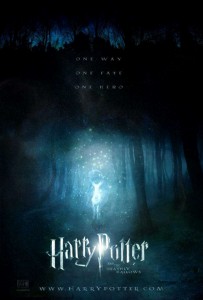 The Harry Potter movie series is almost complete. Just one more movie to go after this one, which will cover the second half of the 7th and final book in the series. If you haven’t read/seen the first six in the series, then you really ought to stop now–there’s no way to discuss this without major SPOILERS to the earlier books.
The Harry Potter movie series is almost complete. Just one more movie to go after this one, which will cover the second half of the 7th and final book in the series. If you haven’t read/seen the first six in the series, then you really ought to stop now–there’s no way to discuss this without major SPOILERS to the earlier books. Joey Jordan (our resident artist) and I are joining forces once again in a different webspace, this time to design and sell t-shirts (and other novelties) with designs of our own devising upon them. The name of our store is Lucky Pig Studio–just click on the name to go check out our wares. You can see a select few of our designs in this article, but we have many more available at the store, each of which can be printed on many types of goods, including t-shirts, tote bags, coffee mugs, baby clothes and more. You can buy right away, and if you order soon your order will hopefully arrive in time for Christmas, making a lovely stocking stuffer for your family or friends.
Joey Jordan (our resident artist) and I are joining forces once again in a different webspace, this time to design and sell t-shirts (and other novelties) with designs of our own devising upon them. The name of our store is Lucky Pig Studio–just click on the name to go check out our wares. You can see a select few of our designs in this article, but we have many more available at the store, each of which can be printed on many types of goods, including t-shirts, tote bags, coffee mugs, baby clothes and more. You can buy right away, and if you order soon your order will hopefully arrive in time for Christmas, making a lovely stocking stuffer for your family or friends.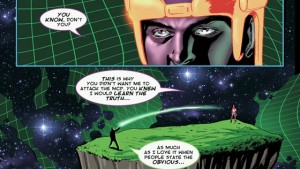 Even after watching the original Tron movie, and playing the Tron 2.0 game, you’re still not satisfied and you just want more and more?
Even after watching the original Tron movie, and playing the Tron 2.0 game, you’re still not satisfied and you just want more and more?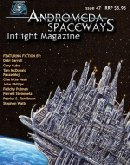 This was the first issue I’ve read of Andromeda Spaceways Inflight Magazine (ASIM) that I ever read, and I was very pleased with what I read. Pleased enough that I asked for an ASIM subscription for Christmas. Not only were my favorite stories from this issue extremely good, I liked almost all of them, and I don’t say that about many magazines. I’m letting my subscription on another magazine lap because I simply like too few of the stories, and the few stories I do like, are just not that good. This issue was so much better I am happy to send my money ASIM’s way.
This was the first issue I’ve read of Andromeda Spaceways Inflight Magazine (ASIM) that I ever read, and I was very pleased with what I read. Pleased enough that I asked for an ASIM subscription for Christmas. Not only were my favorite stories from this issue extremely good, I liked almost all of them, and I don’t say that about many magazines. I’m letting my subscription on another magazine lap because I simply like too few of the stories, and the few stories I do like, are just not that good. This issue was so much better I am happy to send my money ASIM’s way.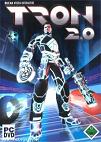 In 2003, twenty-one years after the release of the Tron movie, Buena Vista Entertainment released a sequel. It’s not a movie–it’s a game, a first person shooter (FPS) to be exact). The game somehow seems to have slipped under many gamers’ radars. I hadn’t come across it until five years after its release. Fans of the original movie will enjoy the digital world setting, reminiscent of the original in many ways yet also new and shiny, like 20 years of system upgrades in one fell swoop, and there are plenty of nods to the original for the dedicated fan to catch. But playing the game does not require familiarity with the original movie, so it could draw in new fans of the Tron universe, just in time for the long-awaited of the Tron movie sequel due out next month: Tron Legacy.
In 2003, twenty-one years after the release of the Tron movie, Buena Vista Entertainment released a sequel. It’s not a movie–it’s a game, a first person shooter (FPS) to be exact). The game somehow seems to have slipped under many gamers’ radars. I hadn’t come across it until five years after its release. Fans of the original movie will enjoy the digital world setting, reminiscent of the original in many ways yet also new and shiny, like 20 years of system upgrades in one fell swoop, and there are plenty of nods to the original for the dedicated fan to catch. But playing the game does not require familiarity with the original movie, so it could draw in new fans of the Tron universe, just in time for the long-awaited of the Tron movie sequel due out next month: Tron Legacy. Tron was written and directed by Steven Lisberger and was one of the first major studio movies to make extensive use of computer graphics. The graphics are quite dated by now, of course, but when you watch it just keep in mind that these special effects were amazing in 1982. The previews for Tron Legacy, of course, have updated computer graphics, loads of shiny goodness.
Tron was written and directed by Steven Lisberger and was one of the first major studio movies to make extensive use of computer graphics. The graphics are quite dated by now, of course, but when you watch it just keep in mind that these special effects were amazing in 1982. The previews for Tron Legacy, of course, have updated computer graphics, loads of shiny goodness.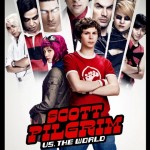 Scott Pilgrim Vs. The World may be one of the strangest movies I’ve ever seen. It’s based on a comic book which I’ve never read (though I now intend to). Whether you like it or not depends almost entirely on whether you like your movies with a heavy dose of weird. For me, I like when a director dares to stray from Hollywood formulas and actually has the guts to try something different, even if the results aren’t spectacular. In this case, the results ARE spectacular, at least to my tastes. It’s a movie that will probably get love or hate reactions depending on if it hits your sense of humor.
Scott Pilgrim Vs. The World may be one of the strangest movies I’ve ever seen. It’s based on a comic book which I’ve never read (though I now intend to). Whether you like it or not depends almost entirely on whether you like your movies with a heavy dose of weird. For me, I like when a director dares to stray from Hollywood formulas and actually has the guts to try something different, even if the results aren’t spectacular. In this case, the results ARE spectacular, at least to my tastes. It’s a movie that will probably get love or hate reactions depending on if it hits your sense of humor.